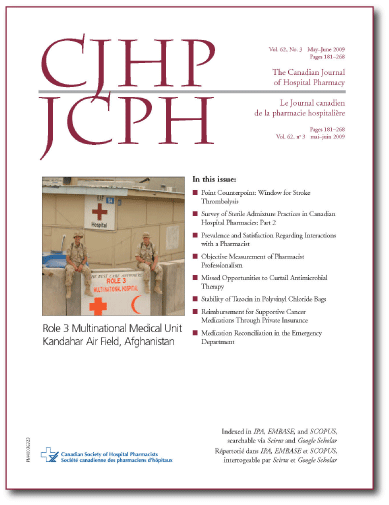Identifying Missed Opportunities to Curtail Antimicrobial Therapy for Presumed Ventilator-Associated Pneumonia Using the Clinical Pulmonary Infection Score
DOI:
https://doi.org/10.4212/cjhp.v62i3.791Keywords:
ventilator-associated pneumonia, artificial respiration, clinical pulmonary infection score, antibacterial agents, pneumonie sous ventilation assistée, respiration artificielle, score d’infection pulmonaire clinique, antibiotiquesAbstract
ABSTRACT
Background: Early discontinuation of antimicrobial therapy for ventilator-associated pneumonia can reduce the emergence of antimicrobial resistance, the occurrence of adverse drug events, and the cost of therapy. Evidence suggests that discontinuation of therapy by day 3 may be appropriate for patients with a clinical pulmonary infection score of 6 or less at baseline and on day 3.
Objectives: To determine the proportion of patients eligible for antimicrobial discontinuation on day 3 and day 7 of therapy and to determine the proportion of eligible patients for whom antimicrobials were discontinued within these timeframes.
Methods: A 6-month observational study was conducted from October 3, 2005, to March 31, 2006, in a 27-bed medical–surgical tertiary care intensive care unit. Clinical pharmacists attended daily rounds and prospectively identified patients for inclusion in the study. A study pharmacist retrospectively calculated clinical pulmonary infection scores. Other data were obtained from the quality-improvement database and patient health records for the intensive care unit.
Results: Ninety-two patients were treated for ventilator-associated pneumonia during the study period, of whom 49 were included in the analysis. At day 3, 17 (35%) of the 49 patients were eligible for early discontinuation of antimicrobial therapy, but therapy was discontinued for only 2 (12%) of these 17 patients. At day 7, 10 (32%) of 31 patients were eligible for antimicrobial discontinuation, but therapy was discontinued for only 1 (10%) of these 10 patients.
Conclusions: A significant opportunity exists at the authors’ institution to develop and implement an antimicrobial discontinuation policy that uses the clinical pulmonary infection score to guide antimicrobial use for patients with ventilator-associated pneumonia.
RÉSUMÉ
Contexte : L’arrêt précoce de l’antibiothérapie dans les cas de pneumonie sous ventilation assistée pourrait réduire l’apparition de résistance antimocrobienne, la survenue d’événements indésirables liés aux médicaments et le coût du traitement. Des données suggèrent que l’arrêt du traitement au jour 3 pourrait être approprié chez les patients présentant un score d’infection pulmonaire clinique de 6 ou moins au début et au 3e jour du traitement.
Objectifs : Déterminer la proportion de patients admissibles à l’arrêt de l’antibiothérapie, aux jours 3 et 7 du traitement, et la proportion de ces patients dont l’antibiothérapie a été effectivement interrompue à ces dates.
Méthodes : Une étude d’observation de six mois a été menée du 3 octobre 2005 au 31 mars 2006, dans une unité de soins intensifs médico-chirurgicale de 27 lits d’un hôpital de soins tertiaires. Des pharmaciens cliniciens participaient aux tournées quotidiennes et ont répertorié de façon prospective les patients admissibles à l’étude. Un pharmacien investigateur a calculé de façon rétrospective les scores d’infection pulmonaire clinique. D’autres données ont aussi été collectées de la base de données sur l’amélioration de la qualité et des dossiers médicaux des patients de l’unité de soins intensifs.
Résultats : En tout, 92 patients ont reçu une antibiothérapie pour une pneumonie sous ventilation assistée au cours de la période de l’étude, et 49 d’entre eux ont été retenus aux fins d’analyse. Au jour 3, 17 (35 %) des 49 patients étaient admissibles à un arrêt précoce de l’antibiothérapie, mais on a procédé à l’arrêt de l’antibiothérapie chez seulement 2 (12 %) de ces 17 patients. Au jour 7, 10 patients (32 %) sur 31 étaient admissibles à l’arrêt de l’antibiothérapie, mais on a interrompu l’antibiothérapie chez seulement 1 (10 %) de ces 10 patients.
Conclusions : L’établissement des auteurs se prêterait particulièrement bien à l’élaboration et la mise en place d’une politique d’arrêt de l’antibiothérapie, qui se fonderait sur les scores d’infection pulmonaire clinique dans les cas de pneumonie sous ventilation assistée.
Downloads
Downloads
Issue
Section
License
Copyright © Canadian Society of Healthcare-Systems Pharmacy.
After publication of a manuscript in the CJHP, the authors of the manuscript must obtain written permission from the CSHP (publications@cshp.ca) before reproducing any text, figures, tables, or illustrations from the work in future works of their own. If a submitted manuscript is declined for publication in the CJHP, all said rights shall revert to the authors. Please note that any forms (e.g., preprinted orders and patient intake forms) used by a specific hospital or other health care facility and included as illustrative material with a manuscript are exempt from this copyright transfer. The CJHP will require a letter from the hospital or health care facility granting permission to publish the document(s).










